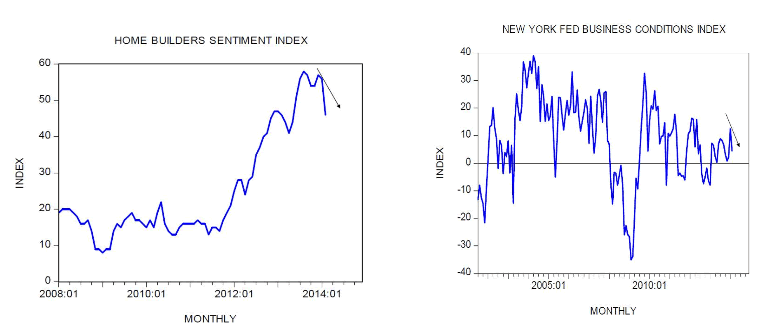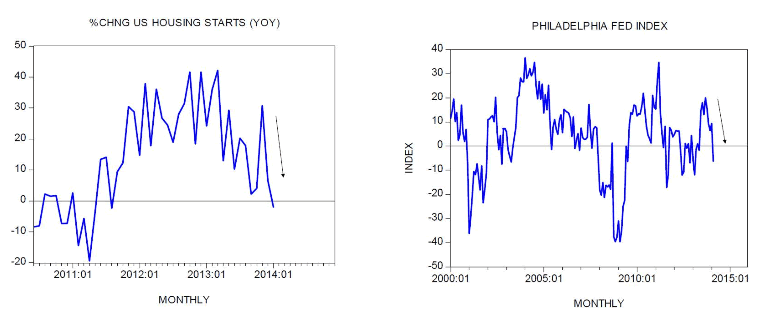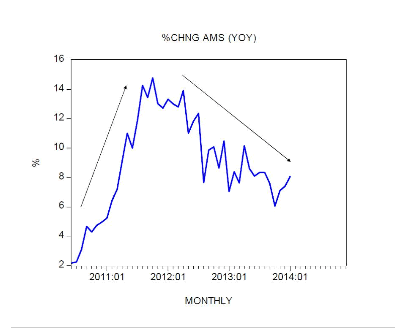Is Bad Weather Behind Weak US Economic Trends?
Economics / US Economy Mar 03, 2014 - 04:39 PM GMTBy: Frank_Shostak
 Some key US economic data shows visible weakening. The National Association of Home Builders/Wells Fargo sentiment index slumped to 46 in February from 56 in January.
Some key US economic data shows visible weakening. The National Association of Home Builders/Wells Fargo sentiment index slumped to 46 in February from 56 in January.
The New York Federal Reserve Bank’s Empire State general business conditions index fell to 4.48 in February from 12.51 the month before.

Also, the yearly rate of growth of housing starts fell to minus 2 percent in January from 6.6 percent in the month before. Whilst the yearly rate of growth for existing home sales fell to minus 5.1 percent in January from minus 0.2 percent in December — the third consecutive month of negative growth.
Furthermore, the Philadelphia Fed business index fell to minus 6.3 in February from 9.4 in January.

Most economic commentators blame the weakening in economic data on bad weather conditions that have gripped much of the US. On this way of thinking the economy remains strong and short setbacks are on account of consumers and businesses putting off purchases. However, this should reverse, so it is held, once the weather improves.
There is no doubt that weather conditions can cause disruptions in economic activity. However, we hold that the recent weakening in the data could be in response to the emerging economic bust brought about by a decline in the growth momentum of money supply (see more details below).
Also, we suggest that the phenomena of recessions is not about the weakness of the economy as depicted by various economic indicators, but about the liquidation of various activities that sprang up on the back of the increase in the rate of growth of money supply. Here is why.
An increase in money supply sets in motion an exchange of nothing for something, which amounts to a diversion of real wealth from wealth generating activities to non-wealth generating activities. In the process this diversion weakens wealth generators and this in turn weakens their ability to grow the overall pool of real wealth (i.e., weakens their ability to grow the economy).
The expansion in the activities that sprang-up on the back of rising money supply is what an economic “boom," or false economic prosperity, is all about.
Note that once there is a strengthening in the pace of monetary expansion, irrespective of how strong and big a particular economy is, the pace of the diversion of real wealth is going to strengthen. Once, however, a slowdown in that pace of monetary expansion emerges, this slows down the diversion of real wealth from wealth producers to non-wealth producers.
This means that various bubble activities or non-productive activities are now getting less support from the money supply, and they fall into trouble.
A weakening in bubble activities is what a recession is all about. Irrespective of how big and strong an economy is, a decline in the rate of growth in money supply is going to undermine various uneconomic activities that sprang-up on the back of the previous increase in the money supply.
This means that recessions or economic busts have nothing to do with the so-called strength of an economy, improved productivity, or better inventory management by companies.
For instance, as a result of a loose monetary stance on the part of the Fed and the subsequent expansion in the money supply rate of growth various false activities emerge.
Now, even if these activities are well managed and maintain very efficient inventory control, this fact cannot be of much help once the central bank reverses its loose monetary stance. Again, these activities are the product of the loose monetary stance of the central bank. Once the stance is reversed, regardless of efficient inventory management, these activities will come under pressure and run the risk of being liquidated.
Having established that recessions are about the liquidations of unproductive activities, why are they recurrent? The reason for this is the central bank’s ongoing policies that are aimed at fixing the unintended consequences that arise from its earlier attempts at stabilizing the so-called economy.
On account of the time lags from changes in money to changes in economic activity the central bank or the Fed is forced to respond to the effects of its own previous monetary policies. These responses to the effects of past policies give rise to the fluctuations in the rate of growth of money supply and in turn to recurrent boom–bust cycles.
We suggest that a fall in the yearly rate of growth of AMS from 14.8 percnt in October 2011 to 8.1 percent in January 2014 poses a threat to various bubble activities that emerged on the back of an increase in the yearly rate of growth of AMS from 2.2 percent in June 2010 to 14.8 percent in October 2011.
Given the fact that there is a time lag between changes in money and changes in economic activity it is quite likely that the increase in the growth momentum of AMS during June 2010 to October 2011 is still dominating the economic scene.
As time goes by however, we suggest that a fall in the growth momentum of AMS during October 2011 to January 2014 can be expected to assert its dominance. This will be mirrored by the decline in bubble activities and in turn in various economic activity indicators.

Frank Shostak is an adjunct scholar of the Mises Institute and a frequent contributor to Mises.org. He is chief economist of M.F. Global. Send him mail. See Frank Shostak's article archives. Comment on the blog.![]()
© 2014 Copyright Frank Shostak - All Rights Reserved Disclaimer: The above is a matter of opinion provided for general information purposes only and is not intended as investment advice. Information and analysis above are derived from sources and utilising methods believed to be reliable, but we cannot accept responsibility for any losses you may incur as a result of this analysis. Individuals should consult with their personal financial advisors.
© 2005-2022 http://www.MarketOracle.co.uk - The Market Oracle is a FREE Daily Financial Markets Analysis & Forecasting online publication.



